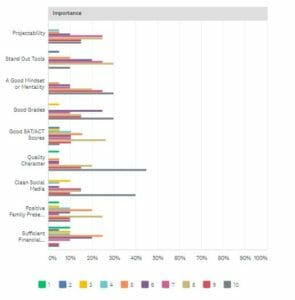During our annual College Coaches Survey, we ask coaches from every level of the college game the following question:
On a scale of 1 (not at all important) to 10 (extremely important), please rate how important it is for a recruit to have each of the following character traits.
- Projectability
- Standout Tools
- Good Mindset/Mentality
- Good Grades
- Good SAT/ACT Scores
- Quality Character
- Clean Social Media
- Positive Family Presence (Parents)
- Sufficient Financial Resources
- Good HS/Travel Ball Stats
In 2018, we calculated the average importance assigned by the pool of coaches below in order of most to least important:
- Quality Character- 8.4 (2018), 9.38 (2019)
- Good Mindset/Mentality- 8.4 (2018), N/A (2019)
- Clean Social Media- 7.95 (2018), 7.29 (2019)
- Good Grades- 7.9 (2018), 8.48 (2019)
- Projectability- 7.65 (2018), 7.48 (2019)
- Standout Tools- 6.95 (2018), N/A (2019)
- Positive Family Presence (Parents)- 6.45 (2018), 7.62 (2019)
- Good SAT/ACT Scores- 6.42 (2018), 7.71 (2019)
- Sufficient Financial Resource- 5.0 (2018), 6.38 (2019)
- Good HS/Travel Ball Stats- N/A (2018), 5.6 (2019)
The following is a histogram with the distribution of answers from 2018:

In 2019, we repeated nearly the same question (an error caused us to omit standout tools and mindset from the 2019 survey). Again, the averages are shown below.
- Quality Character- 9.38
- Good Grades- 8.48
- Good Mindset/Mentality- N/A (8.4 in 2018)
- Good SAT/ACT Scores- 7.71
- Positive Family Presence (Parents)- 7.62
- Projectability- 7.48
- Clean Social Media- 7.29
- Standout Tools- N/A (6.95 in 2018)
- Sufficient Financial Resource- 6.38
- Good HS/Travel Ball Stats- 5.6
While in no way can we claim that this survey is representative of the way all college baseball coaches assign value to recruit attributes, there are some important and telling trends in the answers that deserve closer attention. In these trends and rankings are important lessons for recruits and below we describe the 4 we think are the most important.
Non-Physical Attributes Finish at the Top
Every college coach is going to be looking for a baseline level of baseball skill and projectability in recruits. Without meeting this standard of play, the recruiting process never starts and coaches don’t get the opportunity to evaluate the recruit’s other attributes. It’s not surprising, however, that the 4 attributes with the highest average scores in 2018 and 2019 are all things that the recruit has ultimate control over. They are non-physical, intangible qualities that all coaches are looking for with quality character leading the way. While everyone knows skill is required to be a college baseball player, these non-physical attributes are the difference-makers. Given two recruits with similar skill sets (this happens often), coaches will turn to the intangible, non-physical characteristics to guide their decision. If you are a recruit, you should be aware that everything you do and say matters to those who are recruiting you and you can take comfort in knowing that you have ultimate control over these attributes that matter most.
Social Media Matters
Social media continues to matter a great deal and keeping your social media recruitable is incredibly important to college coaches at every level. As a recruit, you can bet that college coaches are looking at your social media accounts and using what they see to make judgments about your character and other important attributes. Don’t let a silly mistake online cost you a chance at the next level. We won’t include too much here because this is a topic we’ve covered extensively in our content. We encourage you to read the following 3 articles that discuss the importance of being recruitable on the web: Be Smart About Social Media, How Are You Trending on Social Media, and Recruiters Want Players With Clean Social Media.
Academics
Everyone knows that grades and test scores play a huge part of the recruiting process, so why, on average, was there over a full point difference between the average importance ascribed to grades and standardized test scores in 2018 and nearly the same gap in 2019? Looking at the distribution of ratings may help to explain why and it also provides a big lesson to recruits. The distribution of scores coaches assigned the importance of SAT/ACT is fairly even. This may be because test scores don’t matter as much in admissions for coaches at junior colleges and less-academic schools. While the same can be said for grades, grades are often thought of as being a product of effort and work ethic. While coaches often believe that everyone can get good grades in high school if they work hard, SAT/ACT scores are often considered more about fixed intelligence (even though they too can be improved with effort!). Because grades reflect effort and work ethic, qualities that every coach wants to recruit, every coach, regardless of where they coach, is going to place value on kids who are willing to work hard and follow instructions. The big lesson for recruits is that your grades tell coaches a lot more than just how good of an English or math student you are. Coaches place a high value on good grades because not only will they help you get into school and receive academic scholarships, but they are also a sign that you are willing to work hard when it matters.
Baseball Skills and Physicality Matter
There’s a reason why every college coach except for 1 ranked both “standout tools” and “projectability” with a score of 5 or higher and the distribution of answers heavily favored the higher numbers in 2018. As we mentioned before, even though your non-physical attributes may be the difference maker in getting an offer, your on-field skills and physicality are what will get you in the door. Simply put, your physical skills and ability need to be at a certain level to even be considered for further evaluation. While a low-tier junior college may care less about standout tools than a top-tier D1, both schools will recruit players who have the skills required to be successful at their level or at a very minimum, project them to eventually meet that standard. As a recruit, it goes without saying that you need to meet the standard of play on the field to be considered by college coaches.







